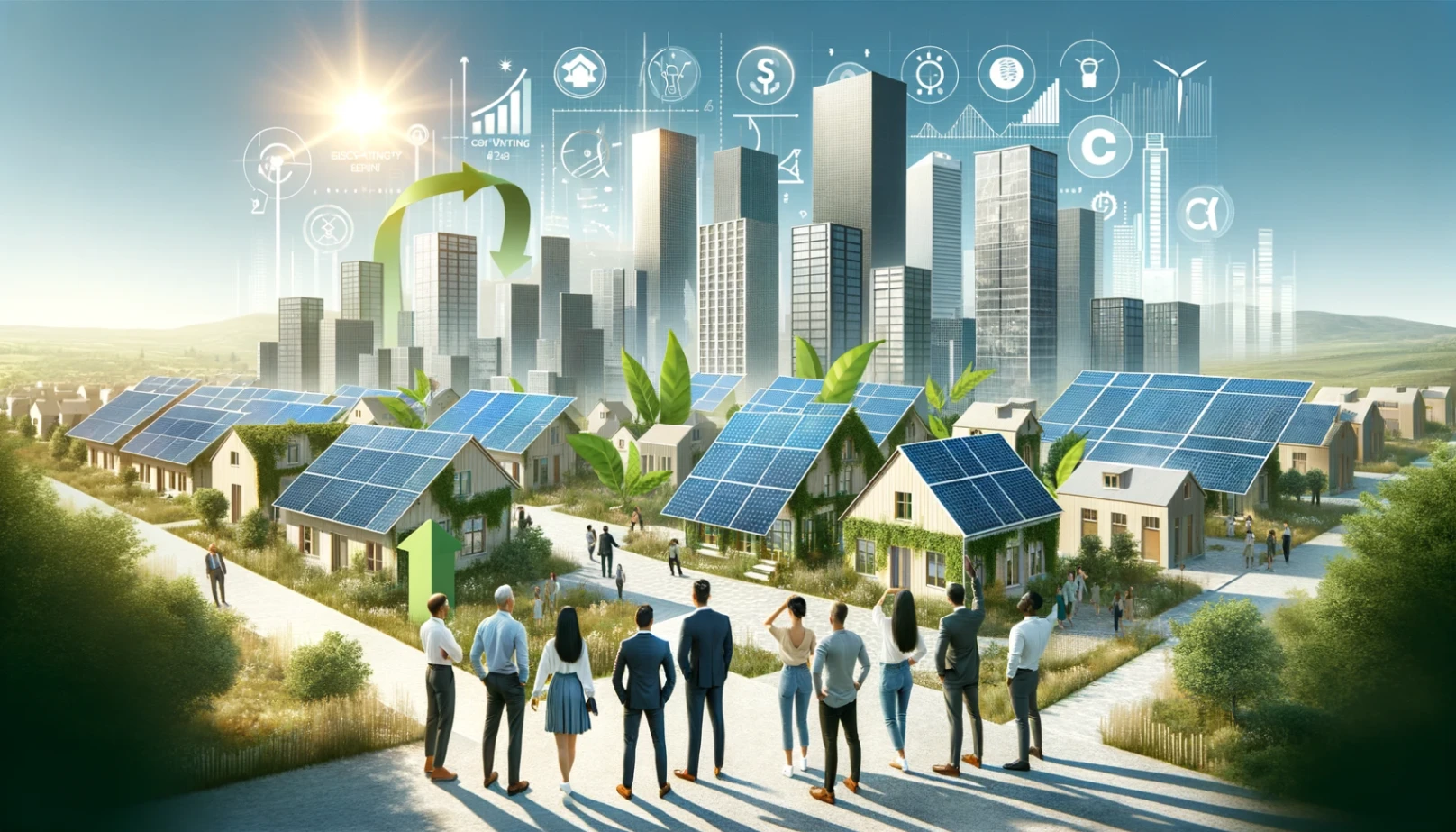Solar panels offer a dual advantage in today’s eco-conscious world: they are environmentally friendly and budget-friendly.
This article delves into the cost-cutting benefits of solar panels, showing how they transform our economy for businesses and homeowners, proving that harnessing solar energy can be both green and economically rewarding.
The Growing Demand for Eco-Friendly Solutions
The increasing demand for eco-friendly solutions clearly reflects our evolving priorities. As environmental concerns mount, individuals and businesses are actively seeking sustainable alternatives.
This growing demand signals a shift towards a greener and more responsible future and presents numerous opportunities for innovation and economic growth.
Solar Panels 101
Solar panels are designed to harness the power of sunlight and convert it into electricity through a process known as the photovoltaic effect. This effect, achieved through the following steps, allows solar panels to generate clean and renewable energy:
- Absorption of Sunlight: Solar panels are equipped with photovoltaic cells made of semiconductor materials, typically silicon. When sunlight strikes these cells, it energizes electrons within the material.
- Electron Excitation: The absorbed sunlight excites electrons in the semiconductor, causing them to become mobile.
- Electric Current Generation: The movement of these excited electrons creates an electric current within the solar panel, producing direct current (DC) electricity.
- Conversion to Usable Electricity: An inverter inside the solar panel converts the DC electricity into alternating (AC) electricity, suitable for powering homes and businesses.
- Energy Distribution: The generated electricity can be used immediately or fed into the electrical grid for distribution to homes and industries.
The Environmental Benefits of Solar Energy
Harnessing solar energy brings many environmental benefits, making it a compelling choice for a sustainable future. Here are the key advantages:
- Reduced Greenhouse Gas Emissions: Solar energy production generates minimal greenhouse gases, helping combat climate change.
- Air and Water Pollution Mitigation: Solar panels produce electricity without releasing harmful pollutants, improving air and water quality.
- Conservation of Natural Resources: Solar power reduces the need for fossil fuels, conserving precious non-renewable resources.
- Lower Carbon Footprint: Solar systems have a smaller carbon footprint than conventional energy sources.
- Biodiversity Preservation: Solar installations have minimal impact on local ecosystems, protecting wildlife and natural habitats.
Cost Savings with Solar Panels
Cost savings from solar panels drive businesses and homeowners toward renewable energy. Despite a notable initial investment, the long-term financial gains eclipse upfront costs. Here’s how solar panels achieve significant savings:
- Reduced Energy Bills: Solar panels slash electricity bills by generating power from sunlight, often eliminating monthly expenses. Excess energy can be stored or sold back to the grid.
- Return on Investment (ROI): Solar systems pay for themselves within a few years, providing a substantial ROI and ongoing savings on energy bills.
- Government Incentives: Governments offer financial incentives and tax credits to reduce the upfront solar panel installation costs.
- Energy Independence: Solar panels stabilize energy prices, shielding users from future utility rate hikes.
- Property Value Boost: Solar installations can increase property resale values, making them an attractive investment.
- Low Maintenance Costs: Solar panels require minimal maintenance and long lifespans, keeping ongoing expenses low.
- Environmental Benefits: Solar energy reduces greenhouse gas emissions and demonstrates a commitment to sustainability, which can have positive social and business implications.
Government Incentives and Rebates
Government incentives and rebates are essential drivers for the widespread adoption of solar energy solutions. They offer financial benefits and environmental incentives, making solar power an attractive choice for individuals and businesses.
Here’s a closer look at how governments support and encourage the use of solar energy:
- Tax Credits: Governments offer financial incentives, like the Investment Tax Credit (ITC), to reduce solar installation costs.
- Cash Rebates: Some regions provide direct monetary rebates or grants to make solar power more affordable.
- Net Metering: Programs allow solar users to sell excess energy to the grid, earning credits or payments.
- Feed-in Tariffs: Governments offer fixed fees for solar energy production, ensuring a reliable income for solar system owners.
- Property Tax Exemptions: Solar installations may be exempt from property tax assessments, providing ongoing financial relief.
- Loan and Financing Programs: Government-backed loans and financing options make solar panel purchases more accessible.
- Renewable Energy Certificates (RECs): Owners can sell RECs to utilities, generating additional income.
- Environmental Incentives: Governments promote solar adoption for its positive environmental impact, encouraging sustainability.
Advantages for Businesses
Solar panels revolutionize businesses of all sizes, extending beyond just environmental benefits. Here’s how solar power positively impacts businesses:
- Cost Reduction: Solar panels significantly cut energy expenses, ensuring predictable and lower operational costs.
- Revenue Generation: Excess energy can be sold or used on-site, creating extra income.
- Tax Incentives: Governments often provide credits, lowering investment costs.
- Green Reputation: Commitment to sustainability attracts eco-conscious customers and investors.
- Energy Reliability: Solar power stabilizes costs and ensures operational continuity.
- Property Value: Solar boosts commercial property values and rental income.
- Regulatory Compliance: Solar aligns with environmental regulations, showcasing corporate responsibility.
- Sustainable Growth: Solar energy fosters long-term sustainability by reducing carbon footprint and fossil fuel dependence.
Advantages for Homeowners
For homeowners, solar panels offer not only eco-friendliness but also financial savvy. Here’s how:
- Lower Energy Bills: Solar panels significantly slash electricity costs.
- ROI: Over time, savings offset initial expenses.
- Property Value: Solar boosts home resale value.
- Tax Credits: Governments offer incentives, reducing upfront costs.
- Energy Independence: Solar ensures stable energy costs.
- Environmental Impact: Solar minimizes the carbon footprint.
- Long-Term Savings: Solar panels need little maintenance.
- Community Influence: Inspire neighbors towards sustainability.
The Environmental Impact
Embracing solar energy is more than just a financial choice; it’s a significant step towards reducing our environmental impact. Here are the critical positive ecological effects of harnessing solar power:
- Reduced Greenhouse Gas Emissions: Solar energy production generates minimal greenhouse gases, contributing to the fight against climate change.
- Air and Water Pollution Mitigation: Solar panels produce electricity without emitting harmful pollutants, improving air and water quality.
- Conservation of Natural Resources: Solar power decreases reliance on finite fossil fuels, preserving precious non-renewable resources.
- Lower Carbon Footprint: Solar systems have a smaller carbon footprint than conventional energy sources.
- Biodiversity Preservation: Solar installations have minimal impact on local ecosystems, protecting wildlife and natural habitats.
Overcoming Common Misconceptions
Despite the numerous advantages of solar energy, common misconceptions may deter individuals and businesses from adopting this renewable power source. Here, we address and debunk these misunderstandings:
- High Initial Costs: While solar panel installation can seem expensive, government incentives and long-term savings often make it cost-effective.
- Intermittent Power Supply: Solar systems can generate power through battery storage, even on cloudy days and at night.
- Maintenance Burden: Solar panels require minimal maintenance and have a long lifespan.
- Incompatibility with Existing Infrastructure: Solar panels can easily be integrated into existing electrical systems.
- Geographic Limitations: Solar energy is viable in many regions, not just sunny areas.
- Large Space Requirement: Solar panels can be installed on rooftops or small regions, efficiently using space.
- Lack of Return on Investment (ROI): Most solar systems pay for themselves within a few years through energy savings and incentives.
- Environmental Impact: Solar energy production is environmentally friendly and reduces carbon emissions.
Summing It Up
In conclusion, the cost-cutting advantage of solar panels benefits our wallets and our planet.
As we continue to embrace renewable energy solutions, the eco-friendly economy powered by solar energy paves the way for a more sustainable and prosperous future.
Investing in solar panels transcends mere financial returns; it’s an investment in a cleaner, greener, and economically sound tomorrow for all.



